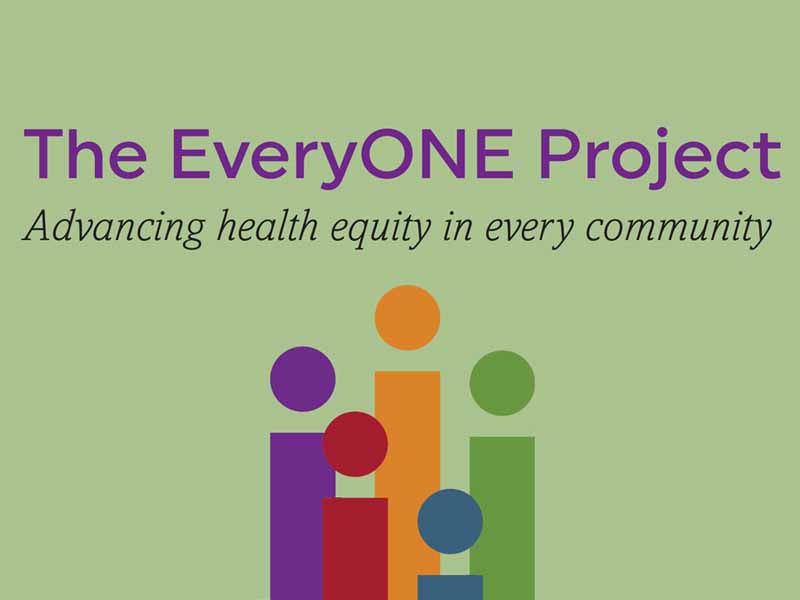The EveryONE Project Unveils Latest Toolkit
October 11, 2018, 03:46 pm Chris Crawford – The EveryONE Project from the AAFP has launched the latest iteration of its comprehensive toolkit to help family physicians address social determinants of health (SDOH) in their practices and communities.
Danielle Jones, M.P.H., manager of the AAFP's Center for Diversity and Health Equity, announced this news during the Oct. 11 general session at the Family Medicine Experience in New Orleans, which featured numerous events that included a focus on SDOH.
The updated toolkit consists of three parts, said Kevin Kovach, Dr.P.H., M.Sc., population health manager in the AAFP Health of the Public and Science Division.
Toolkit Unpacked
The first of these, Practice Leadership for Health Equity, focuses on how medical practices can build a culture that values health equity, develop a system for screening patients for SDOH, and connect patients to community services that specialize in addressing social needs, Kovach said.

Resources in the section focus on building a culture of health equity at the practice level and address learning about patients' communities, uncovering practice staff's unstated assumptions and potential biases, and adopting a practice-wide approach to improve health equity.
Additional tools in this section include links to county health rankings, a health department directory from the National Association of County and City Health Officials, and the AAFP's HealthLandscape Population Health Profiler.
The report Addressing Social Determinants of Health in Primary Care: A Team-based Approach for Advancing Health Equity, which The EveryONE Project released back in April, also is included in this area.
Story Highlights
The second part of the toolkit, Assessment and Action,offers tools to help with the screening and referral process that's outlined in the first part of the toolkit, Kovach explained.
"This includes validated screening questions for a variety of social determinants, tools to work with patients and the Neighborhood Navigator to help identify community services," he said.
The Guide to Social Needs Screening Tools and Resources and Neighborhood Navigator that appear in this section were released previously, Kovach noted.
"However, all of the tools have been refined to fit together more cohesively," he added.
Finally, because health inequities are primarily caused by social and cultural issues, the third part of the toolkit, Community Collaboration and Advocacy, provides information and resources to help family physicians engage with their community and advocate for policies that can reduce health inequities.
Included in this section is The Physician Advocate guide, which is intended to help family physicians facilitate in-service presentations and/or lunch-and-learn sessions to help foster a culture of health equity in the family medicine practice.
This area also includes issue briefs on health in all policies and food insecurity, which are intended to be used by family physicians as they engage with local elected officials and other decision-makers.
"The issue briefs will be an important part of the toolkit, and we will be releasing more on a regular basis," Kovach said.
Greater Purpose
According to Kovach, some of The EveryONE Project's new toolkit elements, such as the in-service PowerPoints and issue briefs, help expand on existing resources from the initiative by making the information more actionable.
"And other resources, like those contained in the Community Collaboration and Advocacy section, expand the toolkit outside of the clinic to help family physicians address the root causes of health inequities that are caused by social and cultural issues," he explained.
The AAFP developed The EveryONE Project toolkit by considering both the "upstream" social factors that create health inequities and their "downstream" implications for patients who present to clinicians.
"Family physicians are important champions for health equity and can help reduce health inequities by addressing their patients' SDOH and by raising the prominence of health equity in their community, among policymakers and within medicine," Kovach said.
"We hope that you find the tools available in The EveryONE Project toolkit valuable and we hope you will work with us to continually improve the tools in the toolkit, as well."
Related AAFP News Coverage
2018 National Congress of Student Members
Students Focus on Protecting Vulnerable Patients, More Training
(8/10/2018)
The EveryONE Project Introduces Neighborhood Navigator
(7/25/2018)